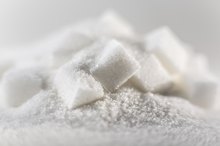Is Glucose Stored in the Human Body?
Glucose is a sugar that serves as a primary energy source for your body. It also provides fuel for optimal brain and nervous system activity, which may help support cognitive functions such as learning and memory. The human body stores glucose in several forms to meet immediate and future energy requirements.
Sources
Glucose is not present in food sources. Instead, your body converts carbohydrates from foods into glucose with the help of amylase, an enzyme produced by your saliva glands and pancreas. Carbohydrates are found in all plant-based foods -- grains and starchy vegetables such as corn and potatoes are particularly abundant in carbohydrates. Beans, vegetables, seeds, fruits and nuts also supply carbohydrates. Dairy products are the only animal-based foods that contain this nutrient.
- Glucose is not present in food sources.
- Carbohydrates are found in all plant-based foods -- grains and starchy vegetables such as corn and potatoes are particularly abundant in carbohydrates.
Glycogen
The Digestive & Circulatory Systems Converting Food Into Energy
Learn More
As you body breaks down carbohydrates into glucose, it delivers it to your bloodstream to supply your body's cells with fuel for energy. Insulin, which is produced by your pancreas, aids in the transfer of glucose through cell walls. Unused glucose is converted to glycogen by a chemical process called glycogenesis, and is stored in muscle tissues and your liver. Glycogen serves as a backup fuel source when blood glucose levels drop.
- As you body breaks down carbohydrates into glucose, it delivers it to your bloodstream to supply your body's cells with fuel for energy.
- Unused glucose is converted to glycogen by a chemical process called glycogenesis, and is stored in muscle tissues and your liver.
Fats
Your liver and muscles can only store a limited amount of glycogen. If your bloodstream contains more glucose than your body can store as glycogen, your body stores excess glucose as fat cells. Like glycogen, fat is stored for future energy; however, glucose storage as fat can contribute to weight gain and obesity. Obesity is a risk factor for diabetes and heart disease, and can increase strain on your bones and joints.
- Your liver and muscles can only store a limited amount of glycogen.
- Like glycogen, fat is stored for future energy; however, glucose storage as fat can contribute to weight gain and obesity.
Hyperglycemia
Foods Containing Glucose or Fructose
Learn More
Your body must store glucose in your bloodstream before converting and storing it as glycogen or fat. Excess glucose in your bloodstream, medically termed hyperglycemia, may cause several symptoms such as poor coordination, lethargy, dizziness, headaches and fainting. Chronic high blood glucose levels may also be toxic to your liver, and may increase your risk of developing Type 2 diabetes.
Related Articles
References
- Oklahoma Cooperative Extension Service; Janice Hermann, Ph.D., RD, LD
- Elmhurst College; Glycogen
- "Prescription for Nutritional Healing"; Phyllis A. Balch, C.N.C., et al.; 2010
- D'anci KE, Watts KL, Kanarek RB, Taylor HA. Low-carbohydrate weight-loss diets. Effects on cognition and mood. Appetite. 2009;52(1):96-103. doi:10.1016/j.appet.2008.08.009
- Adeva-Andany M, Gonzalez-Lucan M, Donapetry-Garcia C. et al. Glycogen metabolism in humans. BBA Clinical. 2016;5:85-100. doi:10.1016/j.bbacli.2016.02.001
- Zajac A, Poprzecki S, Maszycyk A, et al. The effects of a ketogenic diet on exercise metabolism and physical performance in off-road cyclists. Nutrients. 2014;6(7):2493-508. doi:10.3390/nu6072493
Writer Bio
Owen Pearson is a freelance writer who began writing professionally in 2001, focusing on nutritional and health topics. After selling abstract art online for five years, Pearson published a nonfiction book detailing the process of building a successful online art business. Pearson obtained a bachelor's degree in art from the University of Rio Grande in 1997.









